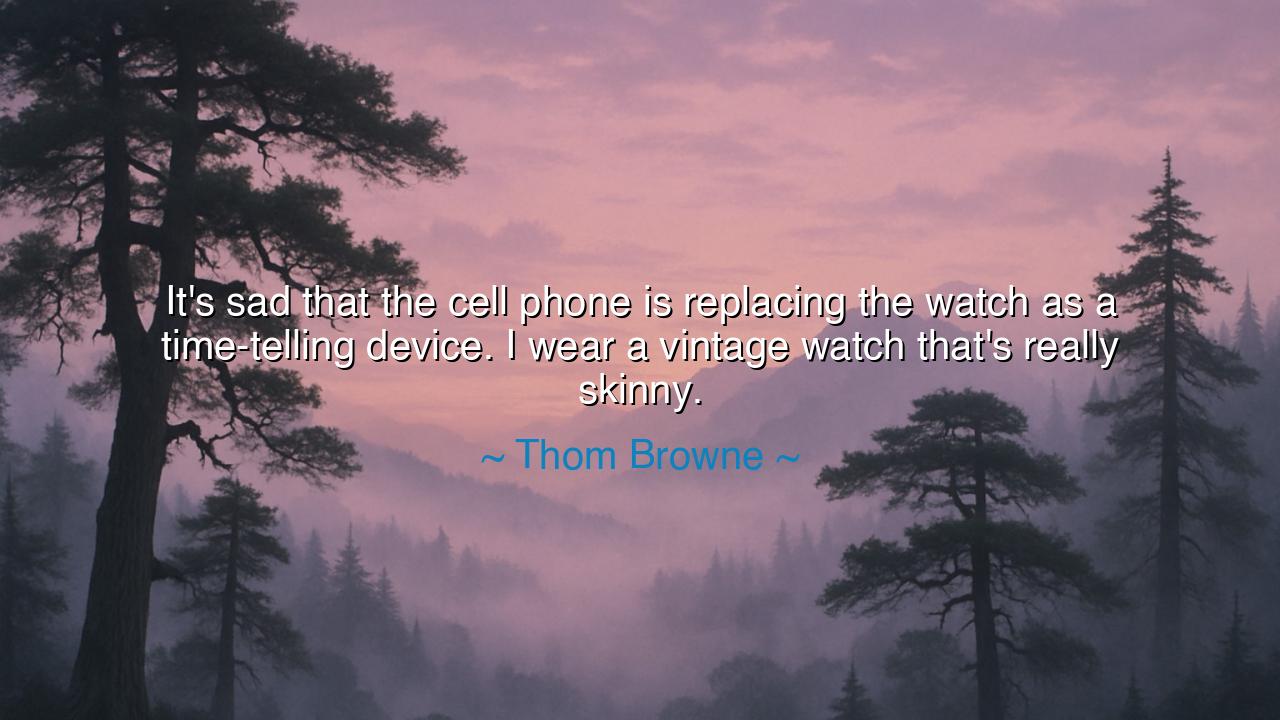
It's sad that the cell phone is replacing the watch as a
It's sad that the cell phone is replacing the watch as a time-telling device. I wear a vintage watch that's really skinny.






Hear the words of Thom Browne, spoken with lament for the passing of a tradition: “It’s sad that the cell phone is replacing the watch as a time-telling device. I wear a vintage watch that’s really skinny.” Though this reflection seems slight, a mere comment on fashion, within it lies the echo of something greater: the sorrow of seeing beauty and meaning displaced by convenience, the lament for symbols of craft and heritage overshadowed by cold utility.
The watch, for centuries, was more than a tool—it was an emblem of dignity, a keeper of memory, a mark of patience and precision. Passed down from father to son, gifted at marriages, engraved to honor achievements, it was at once ornament and heirloom. The rise of the cell phone, practical and powerful though it may be, has stripped time of its poetry. Time once rested on the wrist, a gentle companion; now it hides behind glowing screens, buried in the noise of endless messages and distractions. Browne’s word sad is not nostalgia alone, but the recognition that in the exchange, something human has been lost.
The ancients too knew this tension between beauty and utility. When the Romans built aqueducts, they might have done so with plain stone, but instead they raised arches of elegance, crafting not only water-bearers but monuments. They understood that form is as vital as function, that the things which sustain us should also inspire us. A vintage watch, slim and elegant, carries this same spirit: it measures not just hours, but refinement. To cast it aside for the glowing cell phone is to choose only function, forsaking beauty.
Consider also the tale of the samurai, who carried swords not merely as weapons but as works of art. Their blades were polished with ritual, their hilts adorned with care. To them, the sword was an extension of soul. If one day they had replaced it with a crude iron stick, the spirit of their way would have withered. So too does Browne see the watch as more than an object of time—it is a reflection of soul, of elegance, of reverence for detail. Its decline speaks not just of changing tools, but of changing values.
Yet in his words there is also hope, for he himself wears the vintage watch, slender and enduring. It is a quiet rebellion against the flood of sameness, a statement that tradition can still be honored. And this is the teaching: though the world moves swiftly toward utility, each of us may still choose to keep beauty alive. To wear the old watch, to restore the heirloom, to value not only what works, but what speaks to the heart—this is to preserve meaning in an age that forgets.
The lesson, then, is balance. Let the cell phone tell time if it must, but let not the soul surrender entirely to its glow. Keep with you also those symbols that bind you to history, that remind you of lineage, that slow you down to notice detail. Time is not only to be counted; it is to be honored. A slender watch upon the wrist whispers this truth with every glance: you are not only in the present moment, but in the river of generations.
Practical action follows: if you have an heirloom, wear it. If you own something crafted with care, cherish it. Choose, even in small ways, beauty alongside efficiency. For when you surround yourself only with utility, your life becomes a machine; but when you weave in tradition, elegance, and art, your life becomes a story. The watch may fade from common use, but in your own life, you may still keep it alive, a token of memory and meaning.
Thus, Browne’s lament becomes an ancient teaching: that the objects we carry are not merely tools, but symbols. To replace them carelessly is to erase part of our soul. Let us therefore resist the full tide of utility, and remember that true living is not only about function, but about form, beauty, and the honoring of time itself.






AAdministratorAdministrator
Welcome, honored guests. Please leave a comment, we will respond soon